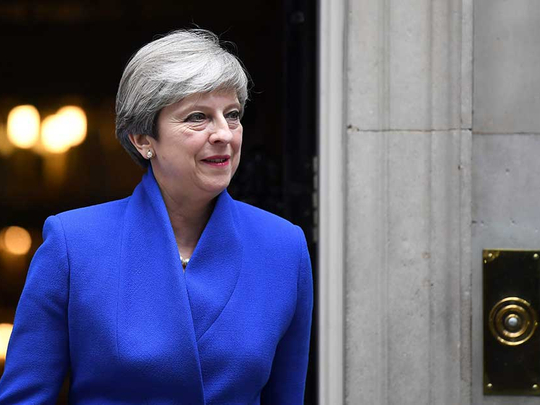
Madrid: Rebuffed at the ballot box, Prime Minister Theresa May has struck a deal to allow her Conservative party to rule the United Kingdom with the support of 10 MPs from the Democratic Unionist Party from Northern Ireland.
Instead of Thursday’s general election being her coronation and mandate for a tough Brexit negotiation position against the other 27 members of European Union, May now finds herself at the head of a party with 13 fewer than when she called the snap election, her judgement questioned and her leadership under threat.
The prime minister visited Buckingham Palace and Queen Elizabeth for permission to form a new government, giving the impression that it was business as usual.
It is not.
Her party has 318 seats, eight short of a majority. And she faces an opposition emboldened by a stunning level of support for Jeremy Corbyn, whose Labour Party picked up 29 more seats and won broad support from young voters.
Along with May’s Conservatives, the Scottish National Party were the other big losers, dropping from the 56 seats it held on dissolution to 35. Its poor showing effectively ended any likelihood of a second referendum on Scotland’s independence any time soon.
Speaking after she was returned as the MP for Maidenhead, May said the Conservatives would seek to form the next government. Throughout the night, she and other senior party figures negotiated support from the DUP.
“At this time more than anything else this country needs a period of stability. And if as the indications have shown and if it is correct that the Conservative Party has won the most seats, and probably the most votes, then it will be incumbent on us to ensure that we have that period of stability and that is exactly what we will do,” she said.
With talks on the terms of the UK’s divorce from the EU due to begin on June 19, May’s government enters the talks in a greatly weakened bargaining position.
Donald Tusk, the European Council president, reminded London that while the start of the two-year Brexit negotiations may have to be delayed, article 50 of the Lisbon treaty had already been triggered and talks would have to be concluded by March 2019.
“We don’t know when Brexit talks start,” Tusk tweeted on Friday. “We know when they must end. Do your best to avoid a ‘no deal’ as result of ‘no negotiations’.”
Sweden’s former Prime Minister Carl Bildt, who now chairs the European Council on Foreign Relations think tank, called the outcome “messy”.
“One mess risks following another. Price to be paid for lack of true leadership,” he tweeted.
Already, Conservative MPs are beginning to question May’s decision to call an early election and are angry at their loss of a majority.
The former education secretary, Nicky Morgan, has called on her party to look for new leadership in the long run. She said it’s right for the prime minister to stay on and seek to form a government, but she can’t fight another election and should take responsibility for the Conservatives’ flawed campaign.
“I’m reeling. I think we’re all reeling. I think there’s real fury against the campaign and the buck stops at the top,” Morgan said. “I think [May] should stay for now, but I think she won’t fight another election — and I think eventually, whether it takes weeks or months, we will have to look at the leadership.”
Corbyn, who defied expectations by increasing his party’s seats and vote share, said that voters had rejected the Conservatives’ economic policies and called on May to resign.
“The prime minister called the election because she wanted a mandate. Well, the mandate she’s got is lost Conservative seats, lost votes, lost support and lost confidence. I would have thought that is enough for her to go actually,” he said.
The outcome places the DUP, committed to maintaining Northern Ireland’s place in the union with Great Britain, at the centre of power.
It had backed Brexit and has wrung guarantees from May that the province’s future in the UK won’t be undermined in Brexit negotiations. The EU27 have already agreed that if Northern Ireland were to be re-united with the Republic of Ireland to the south, it would be fast-tracked into the EU, just as East Germany was treated on re-unification with West Germany in 1990.
— With inputs from agencies












